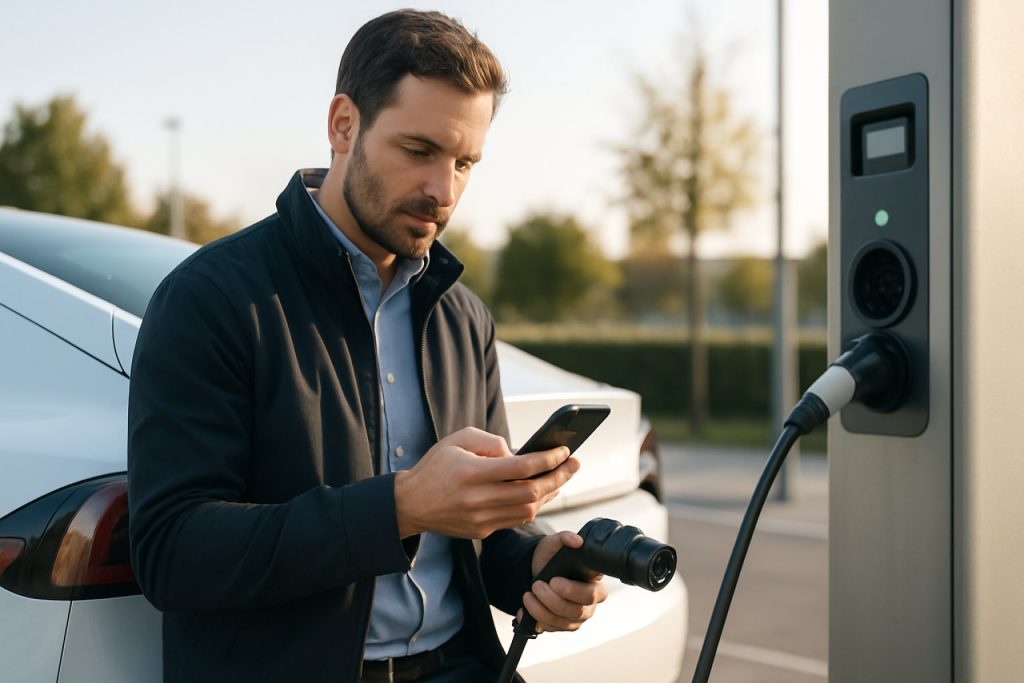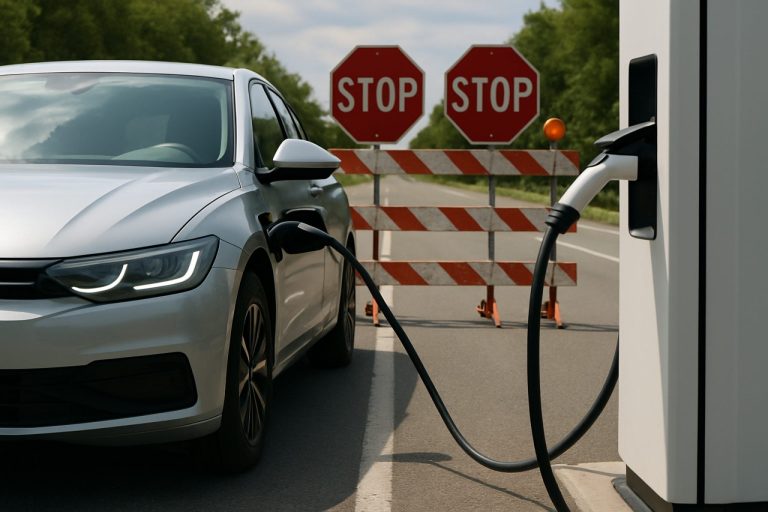
Smart Charging Scheduling in 2025: How AI and Grid Integration Are Revolutionizing EV Energy Management. Discover the Key Trends, Market Growth, and Technology Shaping the Next Five Years.
- Executive Summary: Smart Charging Scheduling Market in 2025
- Market Size, Growth Forecasts, and CAGR (2025–2030)
- Key Drivers: Electrification, Grid Demands, and Policy Initiatives
- Technology Landscape: AI, IoT, and Cloud-Based Scheduling Solutions
- Major Players and Strategic Partnerships (e.g., ChargePoint, Siemens, ABB, Tesla)
- Integration with Renewable Energy and Grid Services
- Business Models: Fleet, Residential, and Public Charging Use Cases
- Regulatory Environment and Industry Standards (e.g., IEC, IEEE)
- Challenges: Interoperability, Cybersecurity, and User Adoption
- Future Outlook: Innovations, Investment Trends, and Market Opportunities
- Sources & References
Executive Summary: Smart Charging Scheduling Market in 2025
The smart charging scheduling market is poised for significant growth in 2025, driven by the rapid expansion of electric vehicle (EV) adoption, grid modernization efforts, and the increasing need for efficient energy management. As EV penetration accelerates globally, utilities, automakers, and technology providers are investing heavily in intelligent charging solutions that optimize when and how vehicles are charged, balancing user convenience with grid stability and cost efficiency.
Key industry players such as Tesla, Inc., BMW Group, and Volkswagen AG are integrating smart charging scheduling features into their vehicles and charging infrastructure. These systems leverage real-time data, predictive analytics, and user preferences to automatically schedule charging during off-peak hours or when renewable energy supply is abundant. For example, Tesla, Inc. offers scheduled charging and “Charge on Solar” features, allowing users to align charging with solar generation and grid-friendly times.
Utilities and grid operators are also playing a pivotal role. Companies like Enel S.p.A. and Électricité de France (EDF) are deploying demand response programs and smart charging platforms that coordinate thousands of EVs, helping to flatten demand peaks and integrate intermittent renewable energy sources. In 2025, these programs are expected to expand, with pilot projects transitioning to full-scale deployments in Europe, North America, and parts of Asia.
Charging infrastructure providers such as ChargePoint Holdings, Inc. and ABB Ltd. are embedding advanced scheduling and load management capabilities into their hardware and software offerings. These solutions enable fleet operators, businesses, and residential users to automate charging based on dynamic electricity prices, grid signals, and vehicle usage patterns. The integration of open communication protocols, such as OCPP (Open Charge Point Protocol), is facilitating interoperability and broader adoption.
Looking ahead, the outlook for smart charging scheduling is robust. Regulatory support, such as mandates for demand-side management and incentives for grid-friendly charging, is expected to accelerate market growth. The convergence of vehicle-to-grid (V2G) technologies, artificial intelligence, and distributed energy resources will further enhance the sophistication and value of smart charging scheduling. By 2025 and beyond, these advancements are set to transform EV charging from a passive activity into an active component of the energy ecosystem, delivering benefits for consumers, utilities, and the environment.
Market Size, Growth Forecasts, and CAGR (2025–2030)
Smart charging scheduling is rapidly emerging as a cornerstone of the electric vehicle (EV) ecosystem, driven by the need to optimize grid integration, reduce energy costs, and enhance user convenience. As of 2025, the market for smart charging scheduling solutions is experiencing robust growth, propelled by increasing EV adoption, grid modernization initiatives, and regulatory support for demand-side management.
Major automotive manufacturers and charging infrastructure providers are investing heavily in smart charging technologies. Tesla, Inc. has integrated smart charging features into its Supercharger network, enabling dynamic load management and time-of-use optimization. Similarly, BMW Group and Volkswagen AG are collaborating with utilities and technology partners to deploy intelligent charging solutions that align with renewable energy availability and grid conditions.
Utilities and grid operators are also playing a pivotal role. Enel S.p.A., through its subsidiary Enel X, has rolled out smart charging platforms across Europe and North America, supporting both residential and commercial customers. These platforms leverage real-time data and predictive analytics to schedule charging sessions during periods of low demand or high renewable generation, thereby reducing grid stress and energy costs.
The market size for smart charging scheduling is projected to expand significantly between 2025 and 2030. Industry sources and company statements indicate a compound annual growth rate (CAGR) in the range of 25–30% for this segment, outpacing the broader EV charging infrastructure market. This growth is underpinned by regulatory mandates for demand response, the proliferation of time-of-use tariffs, and the integration of vehicle-to-grid (V2G) capabilities.
Key players such as ABB Ltd., Siemens AG, and Shell plc (through Shell Recharge) are expanding their smart charging portfolios, targeting both public and private charging environments. These companies are investing in cloud-based platforms, artificial intelligence, and interoperability standards to enable seamless scheduling across diverse hardware and software ecosystems.
Looking ahead, the outlook for smart charging scheduling remains highly positive. By 2030, the majority of new charging stations in developed markets are expected to feature advanced scheduling capabilities, supporting grid flexibility and decarbonization goals. The convergence of EV growth, digitalization, and energy transition policies will continue to drive innovation and market expansion in this sector.
Key Drivers: Electrification, Grid Demands, and Policy Initiatives
Smart charging scheduling is rapidly emerging as a cornerstone technology in the electrification of transport, driven by the dual imperatives of grid stability and policy mandates. As electric vehicle (EV) adoption accelerates into 2025, the need to intelligently manage charging times and loads is becoming critical for utilities, fleet operators, and consumers alike.
A primary driver is the increasing strain on electricity grids as EV penetration rises. Utilities are facing new peak demand patterns, particularly in regions with high EV adoption. Smart charging scheduling enables dynamic adjustment of charging sessions, shifting loads to off-peak hours or periods of high renewable generation. This not only helps prevent grid congestion but also supports the integration of intermittent renewable energy sources. For example, Enel, a major European utility, has deployed smart charging solutions that coordinate EV charging with grid needs, leveraging real-time data and predictive analytics to optimize both user convenience and grid reliability.
Policy initiatives are also accelerating the adoption of smart charging. The European Union’s Alternative Fuels Infrastructure Regulation (AFIR), effective from 2025, mandates that public charging infrastructure must be capable of smart charging, with provisions for bi-directional (vehicle-to-grid, V2G) capabilities in the near future. This regulatory push is mirrored in North America, where the U.S. Department of Energy and state-level programs are funding pilot projects and standards development for interoperable, grid-responsive charging systems. Companies like ABB and Siemens are actively developing hardware and software platforms to meet these requirements, integrating advanced scheduling algorithms and communication protocols.
Data from pilot projects and early deployments underscore the benefits of smart charging scheduling. In the Netherlands, ElaadNL has demonstrated that coordinated charging can reduce peak loads by up to 40%, while also enabling higher shares of renewable energy in the local mix. Similarly, Tesla’s “Scheduled Departure” and “Time-Based Control” features allow users to align charging with lower-cost, lower-carbon electricity, and are being expanded to support utility demand response programs.
Looking ahead, the next few years will see smart charging scheduling become standard in new charging infrastructure, with increasing integration of artificial intelligence and machine learning to further optimize charging patterns. As grid operators, automakers, and technology providers collaborate, the focus will shift from pilot projects to large-scale, interoperable deployments, supporting both grid decarbonization and the mass adoption of electric vehicles.
Technology Landscape: AI, IoT, and Cloud-Based Scheduling Solutions
Smart charging scheduling is rapidly evolving as a cornerstone of the electric vehicle (EV) ecosystem, leveraging advances in artificial intelligence (AI), Internet of Things (IoT), and cloud-based platforms. As of 2025, the integration of these technologies is enabling more dynamic, efficient, and grid-responsive charging solutions, addressing both consumer needs and grid stability requirements.
AI-driven algorithms are increasingly central to smart charging scheduling. These systems analyze real-time data—such as grid load, electricity prices, weather forecasts, and user preferences—to optimize when and how EVs are charged. For example, Tesla, Inc. has embedded smart scheduling features in its vehicles and charging infrastructure, allowing users to automatically charge during off-peak hours or when renewable energy is most available. Similarly, Bayerische Motoren Werke AG (BMW) is piloting AI-based charging management in partnership with utilities, enabling vehicles to respond to grid signals and participate in demand response programs.
IoT connectivity is another critical enabler. Networked charging stations, such as those deployed by ChargePoint, Inc. and Siemens AG, collect and transmit data on charger status, energy consumption, and user behavior. This data is aggregated in the cloud, where advanced scheduling platforms can coordinate thousands of charging sessions across regions. For instance, Enel S.p.A.’s smart charging solutions use IoT sensors and cloud analytics to balance local energy demand and maximize the use of renewables.
Cloud-based scheduling platforms are becoming the backbone of large-scale smart charging deployments. These platforms, offered by companies like Shell plc (through its Shell Recharge Solutions) and ABB Ltd, provide utilities, fleet operators, and consumers with real-time control and analytics. They enable features such as remote scheduling, predictive maintenance, and integration with home energy management systems. In 2025, interoperability is a key focus, with industry bodies such as CharIN e.V. promoting open standards to ensure seamless communication between vehicles, chargers, and the grid.
Looking ahead, the next few years are expected to see further advances in AI-driven predictive scheduling, greater adoption of vehicle-to-grid (V2G) capabilities, and deeper integration with distributed energy resources. As regulatory frameworks mature and grid operators increasingly incentivize flexible charging, smart scheduling will play a pivotal role in supporting the electrification of transport and the transition to a more resilient, sustainable energy system.
Major Players and Strategic Partnerships (e.g., ChargePoint, Siemens, ABB, Tesla)
Smart charging scheduling is rapidly evolving as a critical component of the electric vehicle (EV) ecosystem, with major industry players forming strategic partnerships to optimize grid integration, reduce costs, and enhance user experience. As of 2025, the landscape is shaped by collaborations between charging infrastructure providers, automakers, utilities, and technology firms, all aiming to deliver intelligent, flexible charging solutions.
ChargePoint Holdings, Inc. is a leading global EV charging network operator, actively developing smart charging scheduling features that allow users and fleet operators to optimize charging times based on electricity rates, grid demand, and renewable energy availability. ChargePoint’s open network approach has enabled integrations with utility demand response programs and energy management systems, supporting both residential and commercial customers. The company’s partnerships with automakers and energy providers are central to its strategy, as it seeks to expand its influence in North America and Europe through interoperable, software-driven solutions (ChargePoint Holdings, Inc.).
Siemens AG is leveraging its expertise in grid technology and digitalization to deliver advanced smart charging scheduling for both public and private charging infrastructure. Siemens’ charging management platforms incorporate artificial intelligence and predictive analytics to balance grid loads, minimize peak demand charges, and enable vehicle-to-grid (V2G) services. The company has established strategic alliances with utilities and fleet operators, focusing on large-scale deployments in Europe and North America. Siemens’ ongoing collaborations with automakers and city governments are expected to accelerate the rollout of grid-responsive charging networks in the coming years (Siemens AG).
ABB Ltd. is another major player, offering a suite of smart charging solutions that integrate with energy management systems and support dynamic load balancing. ABB’s charging platforms are designed for interoperability, enabling seamless scheduling across different hardware and software environments. The company’s partnerships with public transit agencies, logistics firms, and renewable energy providers are driving the adoption of smart charging scheduling in both urban and industrial contexts. ABB’s focus on modular, scalable infrastructure positions it as a key enabler of future-proof charging networks (ABB Ltd.).
Tesla, Inc. continues to innovate in smart charging scheduling through its proprietary Supercharger network and integrated vehicle software. Tesla’s systems automatically schedule charging during off-peak hours and can respond to real-time grid signals, optimizing both cost and sustainability for users. The company’s vertical integration—from vehicles to energy storage and solar—enables unique synergies in smart charging, and ongoing expansion of its charging infrastructure is expected to further enhance these capabilities (Tesla, Inc.).
Looking ahead, the next few years will see deeper integration of smart charging scheduling with distributed energy resources, real-time grid management, and advanced analytics. Strategic partnerships among these major players and new entrants will be crucial in scaling intelligent charging solutions to meet the demands of a rapidly electrifying transportation sector.
Integration with Renewable Energy and Grid Services
Smart charging scheduling is rapidly evolving as a cornerstone of electric vehicle (EV) integration with renewable energy and grid services, especially as global EV adoption accelerates in 2025 and beyond. The core concept involves dynamically adjusting EV charging times and rates based on grid conditions, renewable energy availability, and user preferences, thereby optimizing both energy costs and grid stability.
In 2025, several leading automakers and charging infrastructure providers are deploying advanced smart charging solutions. Tesla, Inc. continues to expand its “Scheduled Departure” and “Time-Based Control” features, allowing vehicles to charge when renewable energy is most abundant or electricity rates are lowest. Similarly, Bayerische Motoren Werke AG (BMW) and Ford Motor Company are integrating smart charging into their connected vehicle platforms, enabling users to participate in demand response programs and grid services.
On the infrastructure side, Enel S.p.A. and its subsidiary Enel X are rolling out large-scale smart charging networks across Europe and North America. Their platforms use real-time data from the grid and renewable generation sources to schedule charging sessions, helping to absorb excess solar or wind power and reduce peak demand. ABB Ltd and Siemens AG are also deploying intelligent charging hardware and software that interface directly with grid operators, supporting automated load balancing and frequency regulation.
Utilities are increasingly involved in smart charging pilots and programs. For example, Southern Company and Électricité de France (EDF) are collaborating with automakers and technology providers to test vehicle-to-grid (V2G) and vehicle-to-home (V2H) applications, where EVs can return stored energy to the grid or home during periods of high demand or low renewable output. These initiatives are supported by open standards such as OpenADR and OCPP, which facilitate interoperability between vehicles, chargers, and grid management systems.
Looking ahead, the outlook for smart charging scheduling is robust. As more intermittent renewables come online and grid flexibility becomes paramount, dynamic charging will be essential for balancing supply and demand. Regulatory frameworks in the EU, US, and Asia are increasingly mandating or incentivizing smart charging capabilities in new infrastructure. By 2027, industry leaders anticipate that most new public and private charging stations will be equipped with advanced scheduling and grid integration features, accelerating the transition to a cleaner, more resilient energy ecosystem.
Business Models: Fleet, Residential, and Public Charging Use Cases
Smart charging scheduling is rapidly becoming a cornerstone of electric vehicle (EV) charging business models across fleet, residential, and public use cases. As EV adoption accelerates into 2025, the need to optimize charging times, reduce grid stress, and minimize costs is driving innovation in scheduling algorithms and platform integration.
For fleet operators, smart charging scheduling is essential to manage large numbers of vehicles while controlling operational expenses. Companies such as Tesla and Ford Motor Company are integrating advanced scheduling features into their fleet management platforms, allowing operators to automate charging based on vehicle usage patterns, electricity tariffs, and grid signals. These systems can prioritize charging during off-peak hours or when renewable energy is abundant, directly reducing total cost of ownership and supporting sustainability goals. ABB, a major supplier of charging infrastructure, is also deploying smart charging solutions that enable dynamic load management and real-time scheduling for commercial fleets.
In the residential sector, smart charging scheduling is increasingly offered through home charging stations and connected vehicle apps. Wallbox and Enel X provide chargers that allow homeowners to set charging times based on utility rates or renewable energy availability. Utilities are partnering with these providers to offer demand response programs, where customers are incentivized to schedule charging during grid-friendly periods. For example, EDF Energy and E.ON are piloting time-of-use tariffs and smart charging incentives in several European markets, aiming to shift residential charging away from peak demand hours.
Public charging networks are also embracing smart scheduling to maximize charger utilization and improve user experience. Companies like ChargePoint and EVgo are rolling out reservation systems and predictive analytics to manage charging station availability and reduce wait times. These platforms can dynamically adjust pricing or recommend optimal charging windows based on real-time demand and grid conditions. In addition, interoperability standards promoted by organizations such as CharIN are enabling seamless scheduling across different networks and hardware providers.
Looking ahead, the integration of vehicle-to-grid (V2G) capabilities and artificial intelligence is expected to further enhance smart charging scheduling. By 2025 and beyond, coordinated scheduling across fleets, homes, and public infrastructure will be critical for grid stability and the economic viability of EV charging business models. Industry leaders are investing in open APIs and cloud-based platforms to enable this ecosystem, with ongoing pilots and commercial deployments expected to scale rapidly in the next few years.
Regulatory Environment and Industry Standards (e.g., IEC, IEEE)
Smart charging scheduling is increasingly shaped by evolving regulatory frameworks and industry standards, as governments and standardization bodies recognize its critical role in grid stability, energy efficiency, and the integration of renewable energy sources. In 2025, the regulatory environment is marked by a concerted push towards interoperability, cybersecurity, and grid-responsive charging, with leading standards organizations such as the International Electrotechnical Commission (IEC) and the Institute of Electrical and Electronics Engineers (IEEE) at the forefront.
The IEC’s standards, particularly IEC 61851 (Electric vehicle conductive charging system) and IEC 63110 (Protocol for management of electric vehicles charging and discharging infrastructures), are foundational for smart charging scheduling. IEC 63110, which is being rapidly adopted in 2025, defines protocols for communication between charging stations and management systems, enabling dynamic scheduling, load balancing, and demand response. This standard is crucial for ensuring that charging infrastructure can interact seamlessly with energy management systems and grid operators, supporting real-time scheduling and optimization.
The IEEE, through standards such as IEEE 2030.5 (Smart Energy Profile Application Protocol), is also driving the development of interoperable communication frameworks for distributed energy resources, including electric vehicle (EV) charging. IEEE 2030.5 is widely referenced in North America and parts of Asia for enabling secure, two-way communication between EVs, charging stations, and utilities, which is essential for advanced scheduling and grid services.
Regulatory agencies in major markets are mandating compliance with these standards. The European Union, for example, has incorporated IEC standards into its Alternative Fuels Infrastructure Regulation (AFIR), which comes into force in 2025 and requires public charging infrastructure to support smart charging and grid integration. Similarly, the U.S. Department of Energy and the Federal Energy Regulatory Commission are promoting interoperability and open standards, referencing IEEE and IEC protocols in their guidance for federally funded charging projects.
Industry alliances such as CharIN (Charging Interface Initiative e.V.), which represents a broad coalition of automakers, charging equipment manufacturers, and grid operators, are actively supporting the harmonization of standards and best practices for smart charging scheduling. CharIN’s work on the Combined Charging System (CCS) and the ISO 15118 protocol (for vehicle-to-grid communication) is accelerating the deployment of plug-and-charge and scheduled charging features across Europe, North America, and Asia.
Looking ahead, the regulatory environment is expected to further tighten around cybersecurity, data privacy, and real-time grid coordination. Ongoing updates to IEC and IEEE standards, along with new mandates from regional regulators, will continue to drive the adoption of advanced smart charging scheduling solutions, ensuring that EV charging infrastructure remains secure, interoperable, and responsive to the evolving needs of the power grid.
Challenges: Interoperability, Cybersecurity, and User Adoption
Smart charging scheduling is rapidly becoming a cornerstone of electric vehicle (EV) infrastructure, but its widespread adoption faces significant challenges in interoperability, cybersecurity, and user acceptance as of 2025 and looking ahead. These challenges are particularly acute as the number of EVs and the complexity of charging networks increase globally.
Interoperability remains a primary hurdle. The smart charging ecosystem involves a diverse array of hardware manufacturers, software platforms, and utility providers. Ensuring seamless communication between EVs, charging stations, and grid operators is essential for effective scheduling. However, proprietary protocols and fragmented standards have led to compatibility issues. Industry leaders such as Tesla, Inc., BMW Group, and Volkswagen AG have developed their own charging solutions, which do not always align with open standards like ISO 15118 or OCPP (Open Charge Point Protocol). Efforts by organizations such as CharIN e.V. are ongoing to promote the Combined Charging System (CCS) and harmonize standards, but full interoperability is still a work in progress.
Cybersecurity is another critical concern. As smart charging scheduling relies on real-time data exchange and remote control, the risk of cyberattacks targeting EVs, charging infrastructure, or grid operations is rising. In 2024 and 2025, several industry stakeholders, including Siemens AG and Schneider Electric SE, have intensified their focus on securing communication channels and implementing robust authentication mechanisms. The European Union’s Network and Information Security (NIS2) Directive, coming into effect in 2024, is pushing operators to adopt stricter cybersecurity measures. However, the rapid expansion of connected devices and the diversity of vendors make comprehensive protection challenging.
User adoption is influenced by both technical and behavioral factors. For smart charging scheduling to deliver grid and cost benefits, users must trust and engage with automated systems. Yet, concerns about privacy, loss of control over charging times, and the complexity of interfaces can deter participation. Automakers like Ford Motor Company and charging network operators such as ChargePoint Holdings, Inc. are investing in user-friendly apps and transparent data policies to build confidence. Still, surveys in 2025 indicate that a significant portion of EV owners prefer manual charging due to perceived reliability and control.
Looking forward, overcoming these challenges will require continued collaboration among automakers, charging solution providers, utilities, and regulatory bodies. The next few years are likely to see accelerated standardization, stronger cybersecurity frameworks, and more intuitive user experiences, all of which are essential for the mass adoption of smart charging scheduling.
Future Outlook: Innovations, Investment Trends, and Market Opportunities
Smart charging scheduling is rapidly evolving as a cornerstone of the electric vehicle (EV) ecosystem, with 2025 poised to be a pivotal year for both innovation and market expansion. As EV adoption accelerates globally, the need for intelligent, grid-responsive charging solutions is driving significant investment and technological development. Smart charging scheduling refers to the use of software and communication technologies to optimize when and how EVs are charged, balancing user preferences, grid constraints, and renewable energy availability.
In 2025, several leading automakers and charging infrastructure providers are rolling out advanced smart charging platforms. Tesla, Inc. continues to enhance its integrated charging network with features like scheduled charging and grid-aware charging, leveraging its extensive Supercharger and home charging ecosystem. Bayerische Motoren Werke AG (BMW) is expanding its “BMW Charging” services, which include intelligent scheduling to minimize costs and carbon footprint, and is collaborating with utilities to enable demand response capabilities.
Utilities and grid operators are also playing a crucial role. Enel S.p.A., through its subsidiary Enel X, is deploying smart charging solutions across Europe and North America, integrating real-time grid signals to shift charging loads and support grid stability. Similarly, Électricité de France (EDF) is investing in smart charging pilots that coordinate EV charging with renewable energy generation, aiming to maximize the use of clean power and reduce peak demand.
The outlook for the next few years includes the mainstreaming of vehicle-to-grid (V2G) and vehicle-to-home (V2H) capabilities, where EVs not only schedule charging but also discharge energy back to the grid or home during peak periods. Companies like Nissan Motor Co., Ltd. are at the forefront, with V2G-enabled models and partnerships with energy providers to pilot large-scale smart charging and discharging programs.
Investment trends indicate robust funding for startups and established players developing AI-driven scheduling algorithms, interoperable platforms, and secure communication protocols. Industry bodies such as International Energy Agency (IEA) and IEEE are setting standards to ensure interoperability and cybersecurity, which are critical for scaling smart charging solutions.
By 2025 and beyond, smart charging scheduling is expected to unlock new market opportunities, including dynamic pricing models, grid services revenue streams for EV owners, and enhanced integration of distributed energy resources. The convergence of automotive, energy, and digital sectors will continue to accelerate, making smart charging a linchpin of the sustainable mobility transition.
Sources & References
- Volkswagen AG
- Enel S.p.A.
- ChargePoint Holdings, Inc.
- Siemens AG
- Shell plc
- ElaadNL
- CharIN e.V.
- Enel X
- Southern Company
- Électricité de France (EDF)
- Wallbox
- EVgo
- Institute of Electrical and Electronics Engineers (IEEE)
- Nissan Motor Co., Ltd.
- International Energy Agency (IEA)



